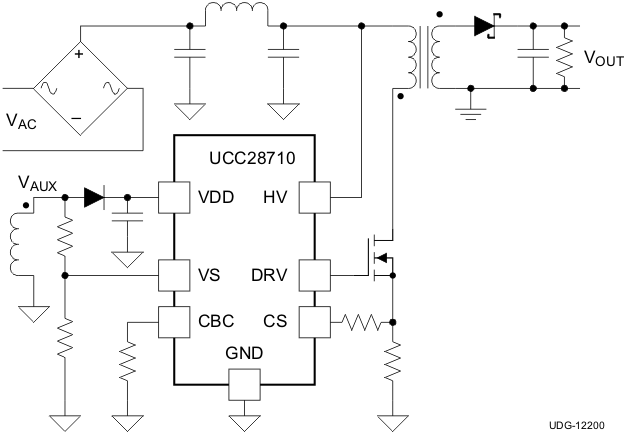SLUSB86C November 2012 – June 2017 UCC28710 , UCC28711 , UCC28712 , UCC28713
PRODUCTION DATA.
- 1 Features
- 2 Applications
- 3 Description
- 4 Revision History
- 5 Device Comparison Table
- 6 Pin Configuration and Functions
- 7 Specifications
- 8 Detailed Description
-
9 Application and Implementation
- 9.1 Application Information
- 9.2
Typical Application
- 9.2.1 Design Requirements
- 9.2.2
Detailed Design Procedure
- 9.2.2.1 Custom Design With WEBENCH® Tools
- 9.2.2.2 Stand-by Power Estimate
- 9.2.2.3 Input Bulk Capacitance and Minimum Bulk Voltage
- 9.2.2.4 Transformer Turns Ratio, Inductance, Primary-Peak Current
- 9.2.2.5 Transformer Parameter Verification
- 9.2.2.6 Output Capacitance
- 9.2.2.7 VDD Capacitance, CDD
- 9.2.2.8 VS Resistor Divider, Line Compensation, and Cable Compensation
- 9.2.3 Application Curves
- 10Power Supply Recommendations
- 11Layout
-
12Device and Documentation Support
- 12.1
Device Support
- 12.1.1 Development Support
- 12.1.2
Device Nomenclature
- 12.1.2.1 Capacitance Terms in Farads
- 12.1.2.2 Duty Cycle Terms
- 12.1.2.3 Frequency Terms in Hertz
- 12.1.2.4 Current Terms in Amperes
- 12.1.2.5 Current and Voltage Scaling Terms
- 12.1.2.6 Transformer Terms
- 12.1.2.7 Power Terms in Watts
- 12.1.2.8 Resistance Terms in Ω
- 12.1.2.9 Timing Terms in Seconds
- 12.1.2.10 Voltage Terms in Volts
- 12.1.2.11 AC Voltage Terms in VRMS
- 12.1.2.12 Efficiency Terms
- 12.2 Documentation Support
- 12.3 Receiving Notification of Documentation Updates
- 12.4 Community Resources
- 12.5 Trademarks
- 12.6 Electrostatic Discharge Caution
- 12.7 Glossary
- 12.1
Device Support
- 13Mechanical, Packaging, and Orderable Information
Package Options
Refer to the PDF data sheet for device specific package drawings
Mechanical Data (Package|Pins)
- D|7
Thermal pad, mechanical data (Package|Pins)
Orderable Information
1 Features
- < 10-mW No-Load Power
- Primary-Side Regulation (PSR) Eliminates Opto-Coupler
- ±5% Voltage and Current Regulation Across Line and Load
- 700-V Start-Up Switch
- 100-kHz Maximum Switching Frequency Enables High-Power Density Charger Designs
- Resonant Valley-Switching Operation for Highest Overall Efficiency
- Frequency Jitter to Ease EMI Compliance
- Wide VDD Range Allows Small Bias Capacitor
- Clamped Gate-Drive Output for MOSFET
- Overvoltage, Low-Line, and Overcurrent Protection Functions
- Programmable Cable Compensation (UCC28710)
- NTC Resistor Interface (UCC28711, UCC28712 and UCC28713) with Fixed Cable Compensation Options
- SOIC-7 Package
- Create a Custom Design Using the UCC28710 With the WEBENCH® Power Designer
2 Applications
- USB-Compliant Adapters and Chargers for Consumer Electronics
- Smart Phones
- Tablet Computers
- Cameras
- Standby Supply for TV and Desktop
- White Goods
3 Description
The UCC2871x family of flyback power supply controllers provides isolated-output Constant-Voltage (CV) and Constant-Current (CC) output regulation without the use of an optical coupler. The devices process information from the primary power switch and an auxiliary flyback winding for precise control of output voltage and current.
An internal 700-V start-up switch, dynamically-controlled operating states and a tailored modulation profile support ultra-low standby power without sacrificing start-up time or output transient response.
Control algorithms in the UCC28710 family allow operating efficiencies to meet or exceed applicable standards. The output drive interfaces to a MOSFET power switch. Discontinuous conduction mode (DCM) with valley switching reduces switching losses. Modulation of switching frequency and primary current peak amplitude (FM and AM) keeps the conversion efficiency high across the entire load and line ranges.
The controllers have a maximum switching frequency of 100 kHz and always maintain control of the peak-primary current in the transformer. Protection features help keep primary and secondary component stresses in check. The UCC28710 allow the cable compensation to be programmed. The UCC28711, UCC28712 and UCC28713 devices allow remote temperature sensing using a negative temperature coefficient (NTC) resistor while providing fixed cable-compensation levels.
Device Information(1)
| PART NUMBER | PACKAGE | BODY SIZE (NOM) |
|---|---|---|
| UCC28710 | SOIC (7) | 4.91 mm × 3.90 mm |
| UCC28711 | ||
| UCC28712 | ||
| UCC28713 |
- For all available packages, see the orderable addendum at the end of the data sheet.
Simplified Application

4 Revision History
Changes from B Revision (July 2015) to C Revision
- Deleted all references to the UCC28714, UCC28715, and UCC28716 devicesGo
- Deleted quasi from quasi-resonantGo
- Added the Development Support, Receiving Notification of Documentation Updates, and Community Resources sectionsGo
Changes from A Revision (December 2014) to B Revision
- Updated Layout Guidelines sectionGo
Changes from * Revision (November 2012) to A Revision
- Added Pin Configuration and Functions section, ESD Ratings table, Feature Description section, Device Functional Modes, Application and Implementation section, Power Supply Recommendations section, Layout section, Device and Documentation Support section, and Mechanical, Packaging, and Orderable Information section Go